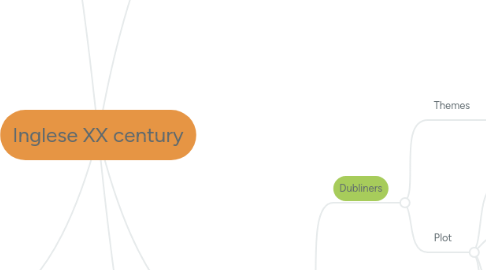
1. Beckett
1.1. Historical background: Cold War, atomic bomb, Nazi camp, Britain like a second class power
1.2. Waiting for Godot
1.2.1. No setting
1.2.2. Two main characters
1.2.3. Plot
1.2.3.1. Static situation of waiting
1.2.3.2. Two tramps are waiting for someone that never comes
1.2.4. Structure
1.2.4.1. Circular structure and grotesque humour
1.2.5. Themes
1.2.5.1. Human impotence
1.2.5.2. Static world
1.2.5.3. Absence of time and disintegration of language
2. Orwell
2.1. Homage to Catalonia
2.1.1. Experience of Spanish civil war
2.1.2. Idea of cleaning with war (futurismo of Marinetti)
2.2. Animal Farm
2.2.1. 3 pigs takes the power in a farm and create a socialist government without human. After that, the pigs takes all the power and change the government in a dictator, becoming like the human that they throw out. “All animals are equal but some animal are more equal than others”
2.2.2. Themes
2.2.2.1. Hilarious vision of totalitarianism
2.2.2.2. Satire on the Soviet Union and on dictatorship
2.2.3. Characters
2.2.3.1. Old Major
2.2.3.2. Three pigs: Snowball, Napoleon, Squirrels
2.2.3.3. Boxer = Hard worker
2.2.3.4. Dogs = Terror State
2.3. 1984
2.3.1. Dystopian romance (Worst future possible)
2.3.2. Life in a big totalitarianism system
2.3.3. Plot
2.3.3.1. 3 continent
2.3.3.1.1. Eurasia
2.3.3.1.2. Oceania
2.3.3.1.3. Estasia
2.3.3.2. Living under control of telescreen and speaking a new language (Newspeak)
2.3.3.3. 4 Minister
2.3.3.3.1. Love
2.3.3.3.2. Plenty
2.3.3.3.3. Peace
2.3.3.3.4. True
2.3.3.4. 2 party
2.3.3.4.1. Inner party
2.3.3.4.2. Outer party
2.3.3.5. Winston works for MinTrue and delete all the words that are anti-regime. He meets Julia during the 2 minutes of hate against Goldstein. They go away and stay together but the Psicopolice, advice by Mr Charrington, arrests the couple. They are torture and at the end they surrender and return in town after a brainwashing.
3. Eliot
3.1. The wast Land
3.1.1. Content
3.1.1.1. Autobiography that talks about the crisis of the poet
3.1.1.2. 5 section, fragment experience of 20 Century
3.1.1.3. Anthology of indeterminate state of mind (hallucinations, impressions)
3.1.2. Theme
3.1.2.1. Nothing is new
3.1.2.2. Disgust of WW1
3.1.2.3. Past fertility and present sterility
3.1.2.4. A new concept of history = repetition of same events
3.1.2.5. Symbols have opposite meanings (spring means death and not rebirth)
3.1.3. Style
3.1.3.1. Association of ideas
3.1.3.2. Technique of implication (importance of the reader)
3.1.3.3. Repetition
3.1.3.4. Objective correlative
3.1.3.4.1. Pattern of objects that can serve effectively to awaken in the reader an emotional response
4. Joyce
4.1. Dubliners
4.1.1. Themes
4.1.1.1. Paralyses
4.1.1.2. Too late for characters for change their life
4.1.1.3. Epiphany
4.1.2. Plot
4.1.2.1. First period
4.1.2.1.1. Young period, first person narrator
4.1.2.2. Second period
4.1.2.2.1. Adolescent period, third person narrator
4.1.2.3. Third period
4.1.2.3.1. Adult period, third person narrator
4.1.2.4. Fourth period
4.1.2.4.1. Old period, third person narrator
4.2. Ulysses
4.2.1. Narration
4.2.1.1. Stream of consciousness (night)
4.2.1.2. Interior monologue (day)
4.2.2. Theme
4.2.2.1. Anti-hero (opposition with the traveler Ulysses)
4.2.2.2. Hero because he works hard all day doing a common things
4.2.2.3. The theme of travel around Dublin
4.2.3. Plot
4.2.3.1. First part
4.2.3.1.1. Stephen’s day
4.2.3.2. Second part
4.2.3.2.1. Leopold Bloom’s day
5. J. Conrad
5.1. Heart of Darkness
5.1.1. Apolipse now
